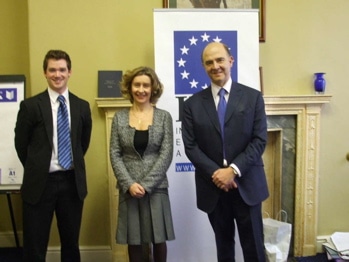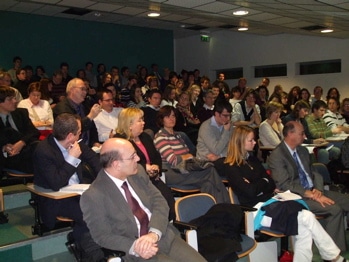Après avoir consulté le blog de Pierre Moscovici je pense que le programme que je lui ai préparé pour la journée devrait lui convenir. Cette journée ressemblera étrangement à celles que son agenda propose, journée sans pause où les rencontres se succèdent.

La journée débute avec Dick Roche, ministre délégué aux Affaires européennes.
Le gouvernement a été formé sur la base d’une coalition entre les Verts auxquels Dick Roche appartient et le Fianna Fail. Dick Roche est aussi membre du parlement, comme tous les ministres du gouvernement. Il est élu dans le Wicklow ce qui lui donne une excellente connaissance du monde rural, essentielle en Irlande. Si les paysans représentent 12 % de la population active, leur poids politique est beaucoup plus important. En effet, une grande partie de la population vient du monde rural et elle reste très sensible aux revendications qui touchent la famille restée sur la terre familiale. Le monde rural est représenté dans les media par un journal très influent, le « Farmers journal ». En ce moment la revendication principale est l’entrée massive de boeuf brésilien sur le marché irlandais auquel les normes de qualité européennes ne s’appliquent pas. Leur revendication est que Bruxelles imposent les mêmes normes à toute viande vendue sur le marché européen ( origine, âge…) qu’elle soit d’orgine européenne ou non.
Pourquoi parlons-nous de cela quand l’entretien doit porter sur l’Europe?
Tout simplement parce que la campagne du « non » se nourrira de ce genre de revendication. Le ministre est attentif et surtout très pragmatique. Il pense que l’Europe est bonne pour les citoyens mais qu’ils ont tendance à oublier les acquis pour se concentrer sur un problème non réglé. Il déplore le fait que quand quelque chose de positif se passe les gouvernements le revendiquent mais si la mesure est perçue comme négative Bruxelles est blamé. Il s’inquiète du nombre important d’indécis. Le dernier sondage donne 25% pour le oui, 13% pour le non et 62% d’indécis. Il est vrai qu’aucune campagne d’information n’a été faite. Il sait que le groupe de presse Murdock dont les journaux sont largement distribués en Irlande et lus par les couches populaires a commencé une campagne du non. Jean-Marie Le Pen, auquel le ministre des Affaires étrangères a officiellement répondu qu’il n’était pas bienvenu, semble être attendu par les défenseurs du « non ». Enfin, les partis politiques qui sortent d’une campagne législative ont peu d’argent à dépenser afin de faire une campagne nationale. Le fantôme du Traité de Nice et l’absence d’une campagne politique qui a vu son rejet dans un premier référendum hante les partis. Ils savent qu’ils n’ont pas le choix mais n’ont pas non plus les moyens. Le Premier ministre Bertie Ahern est rattrapé par une série d’affaires qui l’affaiblissent considérablement. Ces allégations de corruption risquent de miner la campagne du « oui » menée par le gouverenement. Dernier point négatif, le Traité sera le Traité de Lisbonne. Le Ministre pense que son nom n’apporte rien de positif. Il préfèrerait un nom qui parle aux gens.
Le Ministre entend faire une campagne de proximité.
Il a commencé à parler aux associations, aux syndicats très puissants en Irlande notamment dans le service public. Il veut impliquer les associations de femmes auxquelles l’Europe a beaucoup apporté à commencer par le droit de travailler et d’être marié interdit jusqu’à l’entrée de l’Irlande dans l’UE. Les forums sur l’Europe vont se multiplier; un site web va être créer. Il ne veut pas que ce Traité soit compris et accessible seulement aux initiés, » the men in ties » qui a pour effet un phénomène de rejet immédiat dans l’esprit rebel irlandais. Malheureusement la présentation actuelle du texte le rend très difficile d’accès. Il est essentiel de le rendre accessible à tous.
Vous pouvez trouver des infos sur la conférence que Pierre Moscovici a donné à l’Institut ainsi qu’un enregistrement électronique sur le site Web de l’IIEA en cliquant ici.
EU treaty necessary to pull Europe out of rut, says Moscovici
» Pierre Moscovici, former minister for European affairs, head of international relations at the socialist party and deputy in the French National Assembly will talk about France’s place in Europe at two venues in Dublin today.
EU: A self-described ‘militant for a political Europe ‘, socialist Pierre Moscovici talks to Lara Marlowe . »
Few French politicians have as much European experience as Pierre Moscovici. Minister for European affairs during the 1997-2002 Jospin government, he has twice been elected a member of the European parliament and twice a deputy in the French National Assembly. A self-described « militant for a political Europe », he is the socialist party’s national secretary for international relations and a serious candidate to succeed François Hollande as party leader.
Moscovici will share his views on the Reform Treaty and president Nicolas Sarkozy’s foreign policy with the Institute for European Affairs and Dublin Institute of Technology (DIT) today. Attendance at the IEA event, in which the Dutch minister for European affairs Frans Timmerman will also participate, is by invitation only. The DIT talk is a public one.
« France had disappeared from European radars since the referendum on the Constitutional Treaty of May 29th, 2005, » Moscovici says. « The previous president, Jacques Chirac, lost all credibility on the European stage because of the French rejection, which was also addressed to him. » The simple fact of having a new president « turned the page » for France in Europe, Moscovici continued. Once again, France is « audible » in Europe. President Sarkozy is making France heard « with his qualities and his faults ».
Moscovici counts « energy, movement and the ability to propose things » as Sarkozy’s qualities. On the downside, he calls the president « a champion of self-satisfaction ».
The Reform Treaty is « absolutely necessary to pull Europe out of the rut, » Moscovici says, even if it is a « mini-treaty » in which « some rejoice, because they want a mini-Europe. Others like me, who are militants for a political Europe, regret the decline of a certain ambition. » Moscovici prefers the term « modifying treaty » to Reform Treaty or Simplified Treaty, as it is known in France. With 269 articles and about 140 pages of text, it remains complicated, he notes. « It’s the internal rules and regulations, the tool box, the mechanism for decision-making that the Europe of 27 needs, » he says. « Even if it doesn’t change the face of Europe, it is the indispensable condition for relaunching Europe. But it’s not sufficient on its own. » The Reform Treaty will solve Europe’s institutional crisis, but not its political and moral crisis, Moscovici says. For that, the EU needs « a mystique, leaders for whom Europe is a mission and not merely a constraint. »
The most important changes in the treaty, Moscovici says, are the creation of a president of the council for two and a half year renewable terms, the election of the president of the commission in EU parliamentary elections, the extension of qualified majority voting, the advent of double majority voting in 2014 and the creation of a virtual foreign minister for the EU. The Charter of Fundamental Rights will be annexed to the treaty, and will be legally binding for all except Britain, which opted out. « It’s difficult to say whether it’s a ‘Nice Treaty plus’ or a ‘Constitutional Treaty minus’, » Moscovici muses. « It’s a good synthesis that should reassure those who voted Yes and relieve those who voted No. »
Ireland is the only EU country that will hold a referendum on the treaty. While stressing there should be no meddling from outside, Moscovici notes that « all Europe is watching; there is a responsibility of Ireland towards all of Europe ». The French vote weakened France, he adds. « We were on the sidelines for two years. I’m not preaching, just recounting our experience. The French No was costly for France. »
Moscovici says Sarkozy’s foreign policy is « insufficiently European, still too national ». He cites the cooling in relations with Germany, constant criticism of the stability pact and the European Central Bank, and Sarkozy’s failure to fulfil France’s commitments on public finances. He also faults the president for paying lip service to human rights while cosseting dubious leaders. And Sarkozy « is much too close to George W Bush, who is a discredited president at the end of his term. »
Le Monde newspaper last week named Moscovici as one of six contestants to replace Francois Hollande as leader of the socialist party. « I am interested, » he admits. In addition to his experience in government and parliament, he would bring to the job « the will to modernise the party, to make of it a truly social democratic party, not an ideology from the previous century ». Moscovici was once a student of Dominique Strauss-Kahn, the former socialist finance minister who now heads the International Monetary Fund in Washington. He would not be Strauss-Kahn’s cat’s paw in the party, he promises. That said, « If I am first secretary, I will remain his friend. I continue to think he is one of the best, if not the best, to be president of the Republic. »
Pierre Moscovici will give a public talk entitled Is France back in Europe? The International Policies of Nicolas Sarkozy , at DIT in Aungier Street, Dublin at 6pm today, room 3067/3068.
© 2007 The Irish Times 3.12.2007

